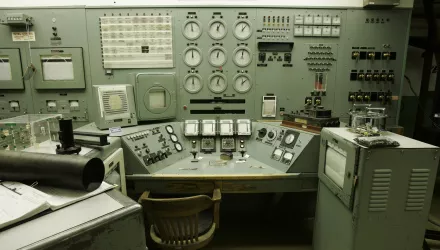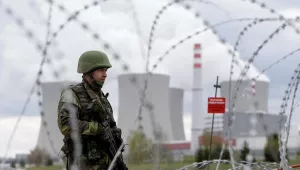Imagine you’re sitting at home one evening when all the lights go out. You get up and feel your way to the fusebox. But no, that’s not the problem. You scrabble around and find a torch. Now at least you can see where you’re going, but that won’t light the whole house. You dig out some old candles, but they only give you small pools of gentle light. Maybe you can get by for a while, but neither the torch nor the candles are going to give you enough light to live by.
We all rely on having enough light to live by, and in the same way, we all rely on having enough energy to live by. For the last few hundred years, that hasn’t been a problem; we have been able to convert oil, coal, and gas into energy without worrying about the consequences. But that has changed. As a planet and as a country, we face two big energy problems.
The first big problem is that fossil fuels like oil, coal and gas are finite. They will run out. But even before they do, they will get scarcer. That will make them more expensive than many populations can afford, and so uneconomical to extract. We need to stop relying on them, and start thinking about what to use instead.
The second big problem is that burning them gives off carbon, which heats the planet. Each year, more and more of us in northern Europe understand that this might not always mean that from year to year in the short term we will see the weather outside our windows change. It means that from decade to decade, people in other parts of the world will. Two years ago, the Bush administration admitted that the north pole was melting so fast that polar bears were now an endangered species. My grandchildren will grow up in a world two degrees hotter than I did. They will watch more floods on the news, barely remember ice on the north pole, and be able to visit deserts in California, Latin America, and Africa in places which are fertile today. All this is a best case scenario.
So the two problems both point in the same direction. The fact that fossil fuels will run out means we need to stop relying on them. And the fact that the earth will reach a climate tipping point if we carry on as we are means that we need to stop relying on them urgently.
So how can Scotland do it? Today, the majority of the energy that we use still comes from fossil fuels. We also get about a quarter from nuclear power, and about 13% from renewable sources like the sun, the wind, and hydroelectricity. Over the next few decades, less of our energy will come from fossil fuels as old power stations shut: Cockenzie coal-fired power station will close in 2015, Longannet in 2020, and Peterhead gas-fired station in 2025. At the same time, more of our energy will come from renewables; in eleven years’ time, the government wants to use renewable energy sources to produce fully half of Scotland’s energy. It is on target.
But even assuming we do manage to generate half of our energy from renewable sources by 2020, we need to start thinking practically about how we are going to generate the other half.
There is only one energy source which makes significant quantities of baseload electricity, makes it without giving off lots of carbon, and already works: nuclear. Scotland’s Sustainable Development Commission now concedes that nuclear power has “an impressive safety record in the UK.” France has never had any accidents with it.
Our international competitors are beginning to realise that no other technology will make up the energy shortfall. Social democratic Sweden has just ended a thirty-year ban, partly because nuclear is the only way it can meet its climate change targets. Finland, Poland, Lithuania, Latvia and Estonia are moving in the same direction. Environmentalists are beginning to realise the same thing. George Monbiot now says that opposing nuclear is now less important than preventing the harm from a radically changing climate. Environmentalists James Lovelock, Stewart Brand, Jared Diamond, and Mark Lynas support a nuclear solution. And advisers to Mr Salmond’s government say the same. The Scottish Parliament’s energy committee, the chairman of the Committee advising the Scottish executive on climate change, and its council of Economic Advisers all say that if Scotland wants to make up the energy shortfall, we cannot rule out nuclear power.
Scotland’s nuclear power plants are due to close, Hunterston B in six years’ time and Torness in 2023. We need to replace them. The Scottish government’s insistence that we do not ignores the big picture. Relying only on renewables or technologies that don’t work yet would be like relying only on torchlight and candles when the lights go out. It would give us some energy to be getting on with. But it would not be enough energy to live by. If you had to cut your energy use down to the level that renewables would produce by 2030, what would you stop doing? Yes, there are questions that the nuclear industry still needs to answer. For example, where to put the waste (even though we’d have to address that even without new plants, and there would only be a little extra waste than we’d have anyway because modern nuclear reactors produce so much less waste per kilowatt hour over their lifespan than older ones). But the big picture is this: no other proven energy source will make up Scotland’s energy shortfall after 2020.
I know that there are well-intentioned people who oppose new nuclear power stations in Scotland. But I respectfully invite them, including Mr Salmond, to take a deep breath and admit that it would be worse to allow runaway climate change and let Scotland run out of energy after 2020.
Azeem Ibrahim is a Research Fellow at International Security Program, Kennedy School of Government at Harvard University and Member of the Dean’s International Council at the Harris School of Public Policy, University of Chicago.
Ibrahim, Azeem. “Power and Energy Priorities Must Include the Nuclear Option.” The Scotsman, February 18, 2009




